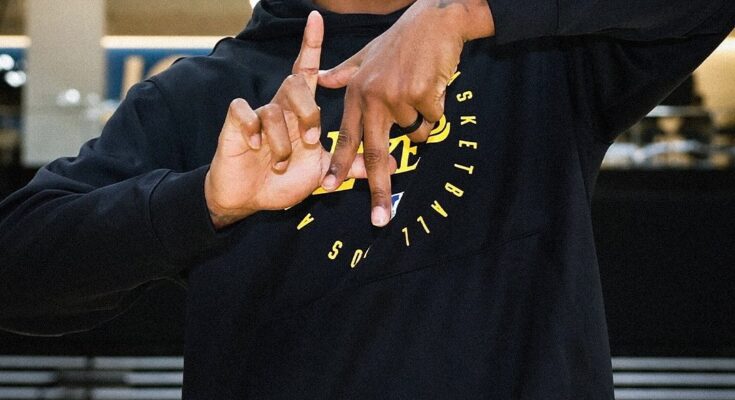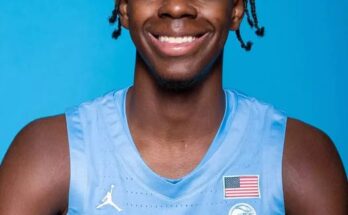Marcus Smart knew this day would come. As soon as he signed the dotted line with the Los Angeles Lakers, he could hear it echo in his mind—jeers, boos, and chants raining down from the very fans who once adored him. There would be no warm welcome at TD Garden this time, no nostalgic video tribute. Just hostility. Noise. A reminder that, in sports, the line between beloved hero and reviled enemy is razor thin. And Marcus Smart, in purple and gold, is now enemy number one in the city where he once reigned.
“I’m expecting a lot of boos,” he said with a knowing half-smile. “I’m expecting a lot of hate. And it’s okay. I understand it.”
Understanding it doesn’t make it easier.
Smart spent the first nine years of his NBA career as the embodiment of Boston basketball. Tough. Gritty. Defensive-minded. A floor general not always polished in execution, but uncompromising in effort. He didn’t just play in Boston—he became part of the city’s DNA. Drafted sixth overall in 2014, Smart was seen at first as a curious piece of the Celtics’ puzzle. But over time, he transformed into the team’s heartbeat. If Jayson Tatum and Jaylen Brown were the Celtics’ future, Smart was its soul.
Through coaching changes, roster turnover, and the growing pains of young stardom, Smart remained constant. Dive on the floor? He was there. Draw a charge? He took it. Fire up the crowd? He did that too, night after night. When Boston reached the NBA Finals in 2022, Smart was the team’s spiritual leader and Defensive Player of the Year—the first guard to win the honor in over two decades. Fans didn’t just respect his hustle—they saw themselves in it.
That’s what makes this homecoming so volatile.
Smart’s departure from Boston wasn’t his choice. In the summer of 2023, he was traded to the Memphis Grizzlies in a deal that helped land Kristaps Porziņģis. It blindsided him. The front office had reassured him he was staying, and days later, he was gone. The outpouring from fans was immediate. There was disbelief, grief, even outrage. How could the Celtics trade the one player who had sacrificed more than anyone else for the cause?
When Smart returned to TD Garden with Memphis, the crowd treated him like a returning war hero. A standing ovation. A heartfelt tribute video. Chants of his name. Even tears. It was emotional—for fans and for Smart himself. “Boston is my second home,” he said at the time. “That love, it doesn’t go away.” He didn’t just wear green. He bled it.
But now, he wears the one color that changes everything.
Signing with the Lakers wasn’t just a basketball move—it was a cultural earthquake. Boston and Los Angeles, two cities bound by history, rivalry, and 17 banners apiece. It’s one of the oldest and most passionate rivalries in all of sports. To go from Boston royalty to donning the Lakers jersey is not a lateral move—it’s crossing a battlefield to the enemy’s front lines.
That’s why Smart’s words about his return carry so much weight. He knows he’s not just another ex-Celtic coming back in a different jersey. He’s returning in *that* jersey. He’s representing the very franchise Celtics fans are raised to loathe.
There’s precedent, of course. Ray Allen left Boston for Miami and became a pariah. Kyrie Irving promised to stay, left anyway, and returned to an arena filled with venom. Even Paul Pierce, though eventually forgiven, received scattered boos when he suited up for the Nets. But Smart’s situation feels uniquely charged because he never asked to leave. His exit was the front office’s decision. He played every game with the intensity of someone who *wanted* to be a Celtic for life.
Still, fans don’t always remember context. They remember laundry. And Smart’s new uniform is stitched with purple, gold, and decades of resentment.
What makes the situation even more complex is that Smart’s role in Los Angeles fits perfectly. The Lakers needed defensive toughness, leadership, and postseason experience. Smart offers all three. With veterans like LeBron James and young stars like Austin Reaves and Luka Dončić (after a surprise offseason deal), the Lakers suddenly have the structure to make another title run. And Smart isn’t just tagging along. He’s being counted on to be the glue—the same role he played so well in Boston.
He’s already embraced the challenge. “If you love this game, you embrace every part of it—even the hate,” he said during his Lakers media availability. “I know Boston fans. I was one of them. I know what it means to walk into that building wearing that jersey. They’re going to let me hear it. I wouldn’t want it any other way.”
The intensity of his statement mirrors the exact kind of edge that once made Boston fans idolize him. And perhaps that’s the tragedy in all this—that the very qualities that made Smart a hero will now make him a villain in the eyes of the same crowd. Because they know what he brings. They know he won’t shrink from the moment. They know he’s going to take charges, clap in players’ faces, and talk trash. And now, he’s doing it *against* them.
When the Lakers travel to Boston for the first time this season, the TD Garden will be electric. Not just because it’s Lakers vs. Celtics. But because of the tension radiating from one player: Smart. The reception will be complicated. There may be a few cheers. Some standing ovations from those who still remember the sacrifices. But when the ball tips off, and the intensity rises, the sentiment will shift.
It will sound different this time. Louder. Angrier. Personal.
“I don’t hold anything against the fans,” Smart said. “They’re passionate. That’s what made Boston special. I know it’ll be hostile, but I’m not coming in looking for hugs. I’m coming to compete.”
That’s the other layer to this story—Smart *wants* the boos. He feeds off them. He’s built a career out of proving people wrong, out of being the underdog, the instigator, the guy you hate until he’s on your team. And now, he’s playing the role of antagonist with full awareness. This is not a man hoping to sneak in under the radar. He’s walking into the fire with a smile.
The Celtics, meanwhile, are in a transitional moment themselves. The core remains strong—Tatum, Brown, Derrick White—but their identity is in flux. Gone are Smart, Horford, and Holiday. Porziņģis remains, but health is always a question mark. For years, Smart was the defensive organizer and emotional thermostat. Without him, it’s unclear who fills that role. So when he returns in another uniform, the contrast will be stark.
What does it say when your former emotional leader is now helping your biggest rival win?
Some fans will never forgive the front office for letting Smart go. Others will never forgive *him* for going to the Lakers, regardless of how the exit happened. That’s the paradox of fandom. Love can curdle into bitterness with frightening speed.
But beneath all of that, somewhere in the static of boos and chants, there will be a deeper truth—Celtics fans still care. You don’t boo players you’ve forgotten. You boo players who mattered. You boo players who once made you believe.
Marcus Smart knows this better than anyone.
So when he steps onto the TD Garden floor as a Laker, and the crowd rains down all that animosity, don’t expect him to flinch. He’ll take it. He’ll thrive in it. And if he gets the chance to hit a dagger three or force a momentum-swinging turnover, he won’t hesitate. Because he’s not there to relive old memories.
He’s there to beat you.
And in a way, that’s the most Marcus Smart thing of all.



